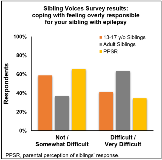Psychosocial Concerns of Growing Up With a Sibling With a Severe Epileptic Encephalopathy: Results From the Sibling Voices Survey Identify Potential Targets for Psychosocial Assessment
Abstract number :
2.424
Submission category :
17. Public Health
Year :
2018
Submission ID :
502098
Source :
www.aesnet.org
Presentation date :
12/2/2018 4:04:48 PM
Published date :
Nov 5, 2018, 18:00 PM
Authors :
Carla Schad, Zogenix, Inc.; Laurie D. Bailey, Zogenix, Inc.; Arnold Gammaitoni, Zogenix, Inc.; Bradley Galer, Zogenix, Inc.; and Lauren Schwartz, University of Washington
Rationale: The Sibling Voices Survey is a comprehensive analysis of siblings’ own perceptions of factors impacting quality of life when growing up with a sibling with a severe pediatric epileptic encephalopathy (EE), including Lennox-Gastaut syndrome (LGS) and Dravet syndrome (DS). Methods: Participants anonymously completed 1 of 4 online, institutional review board-approved, cohort-specific surveys (parents; and siblings 9-12 years old [y/o], 13-17 y/o, and =18 y/o [adult]) developed in consultation with LGS/DS patient communities and healthcare professionals. Survey questions were answered using a visual analog scale or categorical responses (yes/no or 0-3 scale scores). Free-form responses were also solicited. Results: Of 248 submissions (parents, n=128; and siblings 9-12 y/o, n=24; 13-17 y/o, n=17; and =18 y/o [adult], n=79), sibling respondents represented 107 families of EE patients. Questions designed to assess burden of responsibility in siblings indicated that, although =88% of 13-17 y/o reported knowing how to help their sibling with epilepsy, most (69%) reported being uncomfortable when left alone with him/her. More 13-17 y/o and adult siblings reported feeling overly responsible for their affected sibling than parents perceived (Figure). When asked questions about the potential of transition of care from parent to sibling, most adult siblings expressed concern over the psychological/emotional toll of caring for their affected sibling (61%), fear that something bad would happen to their sibling in their care (66%) or if something happens to them (62%), and concern over being able to provide a fulfilling life (62%). In questions designed to identify differences in the way siblings engage with each other, most parents (71%) reported that the unaffected sibling treated their sibling with epilepsy differently than unaffected siblings; in addition, most parents (57%) reported disparities in their own parental discipline among affected and unaffected children. Parents also reported perceiving more feelings of jealousy/resentment from the unaffected sibling toward their sibling with epilepsy (43%) than sibling self-reports (18%). Some 9-12 y/o (12%) reported feelings of anger then guilt over their sibling’s diagnosis. Some 13-17 y/o reported feelings of guilt (35%), resentment (12%), and jealousy (18%) toward their sibling. Conclusions: Responses identified specific concerns about growing up with siblings with severe epilepsy, and the need for increased awareness of the potential impact of severe EEs on the entire family unit, particularly siblings. Focusing resources in these areas could improve sibling well-being and functioning during childhood and the transition of the unaffected sibling into adulthood/independent living. Future research should focus on further understanding the health economic impact on unaffected siblings and identifying specific interventions to improve care and reduce the emotional burdens/stress they may experience. Funding: Zogenix, Inc.
